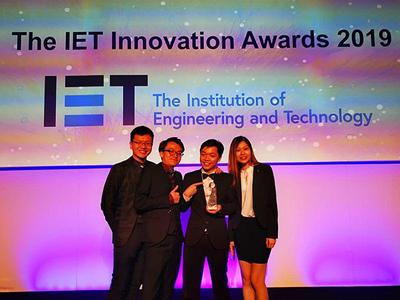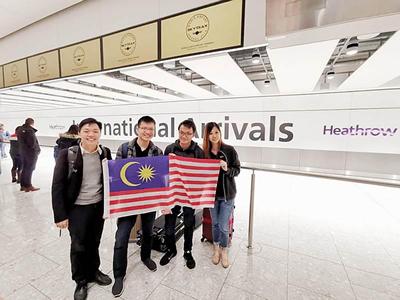Tempeh-Inspired Packaging to Reduce Plastic Waste and Save the Environment

Led by an academic from the University of Southampton Malaysia, a team of researchers made it possible to reduce the amount of single-use plastic waste inspired by tempeh in a recent global challenge by The Institution of Engineering and Technology (IET).
The Institution of Engineering and Technology (IET), in association with environmental groups, Greenpeace and GreenSeas Trust, launched the IET Global Challenge. This international competition brought together 18 to 35-year olds to create solutions for the worldwide plastic waste crisis in a bid to ‘Save our Seas’.
Team NanoMalaysia made up of Ivan Ling (University of Southampton Malaysia), Pauline Phoon Bao Lee (University of Malaya), Tan Chin Joo (University of Malaya), and Ong Chong Cheen (Universiti Teknologi PETRONAS) impressed judges with their invention called the PICAS block. Made of carrageenan and starch, the block forms a dissolvable food block that replaces traditional single-use plastic usually relied on in supermarkets. The clear layer of starch functions to hold the loose item while carrageenan envelops it to prevent moisture from getting in.
Led by Ivan Ling from the University of Southampton Malaysia, the multi-varsity team worked together cross-country over nine months to ensure that the project was a success. Team NanoMalaysia alongside Team Baywatchers won the IET Global Challenge, a platform where many innovations have become a reality.

“Our team members are from multi-institutions and that makes our team interesting because most of other teams came from the same institution,” Ivan said.
Despite the obvious difficulty of logistics, the team has no intentions of slowing down or stopping their research anytime soon. While the current PICAS block prototype is used to package beans, expansion into packages a range of other products is being looked into. Dried food products that need to be washed and cooked before consumption are the focus with items like pasta and grains currently being tested on. The goal is to eventually commercialise the PICAS block to tackle the increasing concerns of environmental destruction with the accumulation of plastic waste.
Ivan Ling also added, “One of the recent issues as the Minister of Energy, Science, Technology, Environment and Climate Change (MESTECC) has pointed out is the dumping of plastic waste in Malaysia from other countries. This got us thinking that we can play a role in helping to solve this. As scientists we believed we could tackle this problem and this is what inspired us to build the PICAS block.”
Both winning teams received £500 cash prize, trophy and all-expenses-paid trip to attend the IET’s prestigious Innovation Awards ceremony on the 13th of November at The Brewery, London, where their winning solution will be revealed to an audience.
The University of Southampton Malaysia was established in 2012 and offers world-class engineering programmes which include the Engineering Foundation Year and undergraduate MEng programmes in Mechanical Engineering, Aeronautics and Astronautics, and Electrical and Electronic Engineering.
Offering a unique student experience, students spend their first two years in Malaysia and their final two years in the UK. The University of Southampton is also ranked as a Global Top 100 University according to the QS World University Rankings 2020 and its engineering programmes are ranked among the Top 10 in the United Kingdom. To learn more about the University of Southampton Malaysia, visit www.southampton.edu.my or call 07 560 2560.